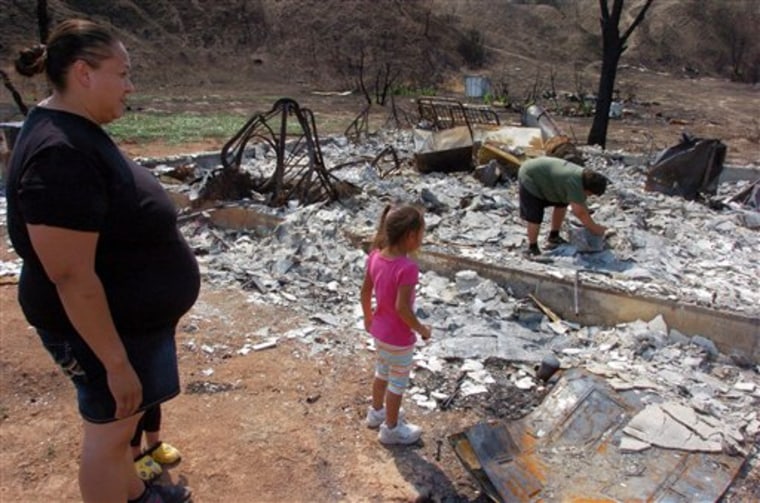Ten-year-old Sheldon Limpy kicked through a jumble of burned metal and charred wood, frowning his way through the ruins where his family's house once stood at the edge of Montana's Northern Cheyenne Indian Reservation.
Somewhere in the ashes were Sheldon's new ceremonial dancing outfit and the teepee his family usually stays in for the Labor Day weekend pow-wow in a nearby town. The items were lost in a June wildfire that witnesses said ripped through as if the land had been doused with gasoline.
"It's hard seeing your kids lose everything. I don't know how to explain it to them," said Sheldon's mother, LuAnna Fox, as she watched him search in vain yet again for something to salvage.
In an epic wildfire season that has destroyed hundreds of homes throughout the West, it's been an especially brutal one for the Northern Cheyenne, 4,500 people on a reservation short on resources and struggling to recover as flames devoured much of their arid land.
Including surrounding areas of southeastern Montana, dozens of major blazes have burned a combined half-million acres. That's more than 780 square miles, or about half the size of Rhode Island, and includes more than 90 square miles on the reservation.
The fires have torched 19 houses, ruined vast expanses of rangeland for livestock, prompted widespread evacuations and left older residents and others suffering respiratory problems from the pervasive smoke.
Police patrols are few, and fire victims including Fox say they've had scrap metal and propane tanks looted from their burned properties. And the protracted firefighting effort has frayed nerves and given rise to rumblings about the response.
All of it added new strains to a rural reservation where roughly one in three families live below the poverty line and almost two of three adult tribal members don't have jobs.
Few nonprofit organizations have the resources to help because of the remoteness of the reservation, said Jennifer Perfater, tribal liaison for the American Red Cross of Montana. Mix in the financial problems faced by victims and the extent of the burn — it rolls up and down hillsides and across the prairie for dozens of miles — and prospects for an easy recovery appear slim.
"Most of middle class America would be able to recover," Perfater said. "But on the reservations here, you've got people who don't have homeowners insurance because they can't afford it. They've completely lost their homes."
Also hard hit is the neighboring Crow Indian Reservation, home to the Northern Cheyenne's historical adversaries, who now share their modern-day afflictions of high unemployment and widespread poverty. Almost 150 square miles of Crow land have burned.
The Crow fared somewhat better than their neighbors, with only one house and an abandoned trailer home lost. Yet it will be a long time before the landscape itself recovers — even with intensive replanting and erosion controls that could last three to four years, said Randy Pretty On Top with the Crow Agency Bureau of Indian Affairs fire division.
For the Northern Cheyenne, federal agencies helped line up trailers for displaced families and will sponsor much of the environmental rehabilitation. The state provided a shipment of school supplies for child fire victims, and donations of food and clothing have poured in.
But tribal officials said they will have to take care of their own over the long term. Housing tops the list of needs. That's a long-running problem for the reservation, where about 300 people already were on a waiting list for low-income rental units.
Fox and her six children are in temporary housing provided by the tribe — a sparsely-furnished duplex in a cluster of houses known as Rabbittown along U.S. Highway 212.
Fox is unsure of their next move. Maybe a Federal Emergency Management Agency trailer, although she said the family would need to build at least a basement on the site of their former home if they are to fit everybody inside. She had no insurance on the house, which was once her grandfather's.
Her car broke down during the evacuation, so Fox said she and her children have walked the mile-and-a-half into nearby Ashland to get groceries. She usually gets a ride home from there. She said her common-law husband, Dexter Poitra, has been working long shifts at an elderly care center so the family can make ends meet.
Fox's father, Joe Fox, is a tribal leader, and he and other officials pledged to help those who lost homes get back onto their property. Only three of the 19 houses lost were insured, said Michael Speelman with the Northern Cheyenne Housing Authority.
With 56 people displaced, FEMA trailers are being offered to those who lost homes, Speelman said. "In some cases the folks don't have too much money so the FEMA home is going to be their home forever and ever," he said.
Hundreds of state, federal and contract firefighters descended on the region to tamp out the largest of the blazes to hit the reservation. Yet sporadic smaller fires keep breaking out, eating up large swaths in just a few hours. With some locally-based firefighters out of town fighting blazes elsewhere in the West, ranchers have pitched in with tractors and backhoes to carve fire breaks around houses.
Authorities say this year's fire season could last through September.
Like others, Fox's family had no time to prepare as a wall of flame bore down on them. They escaped with only a laundry basket of dirty clothes that Fox said her daughter grabbed on the way out the door. She later discovered most of those clothes had holes in them from burning embers, Fox said.
They still plan to go to the pow-wow, where Sheldon's sisters will be receiving their traditional Northern Cheyenne names. But they've had to cobble together a dance outfit for him, and they've lost the original "give-away" gifts — blankets and food baskets — that Fox wanted to hand out to friends and family.
"It's not how I wanted it," she said.
